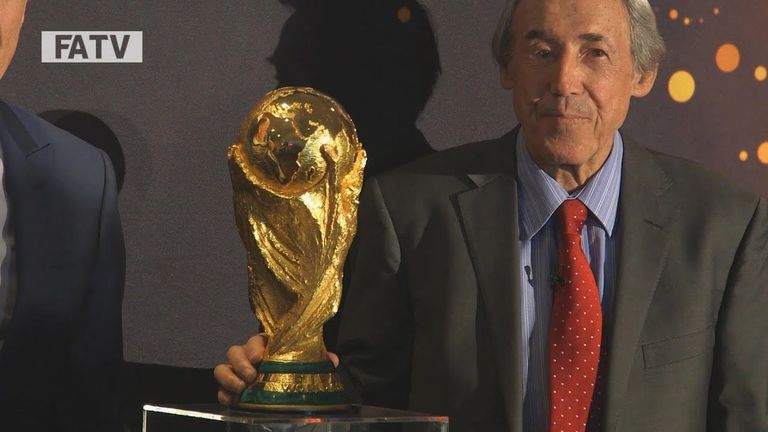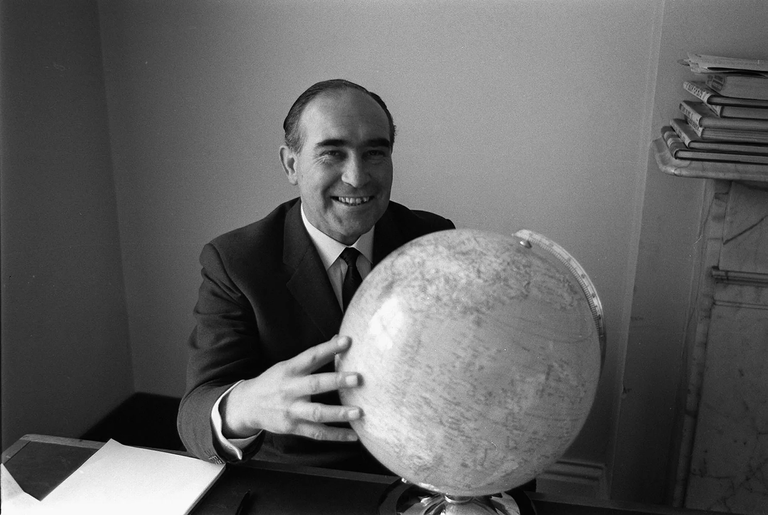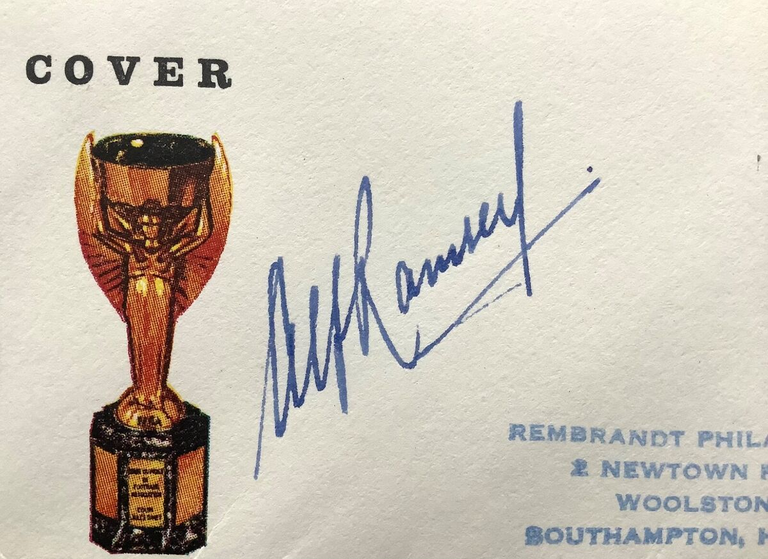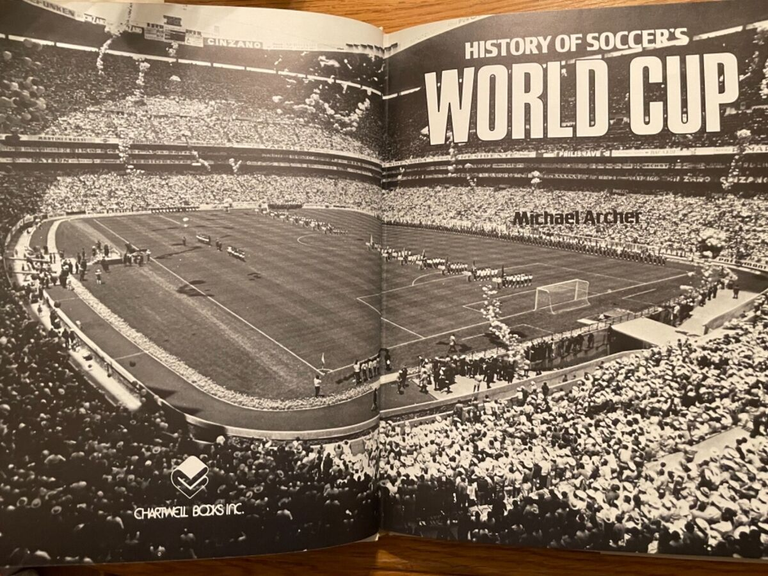
Alf Ramsey was the only coach to lead the inventors of football to the world title. He is still missed in his homeland. For Argentina, though, he was forever linked to a very unpleasant memory.
He soon learned a lesson that he put into practice immediately: never underestimate anyone, any opponent, regardless of background or appearances. In 1950, Alfred Ernest Ramsey was 30 years old and had a valuable career in the English top flight. The selected inventors were appearing at a World Cup for the first time (he had been absent by choice in 1930, 1934 and 1938) and he was one of the defenders called upon to turn presumptions of superiority into positive results.
On 29 June, the English had to prove what they believed: that they were the best in the world. The opener against Chile (2-0 at the Maracana in Rio de Janeiro) had lived up to expectations. The next step looked very much like paperwork on their supposedly crescendoing journey to the title. Opposing them at the Independencia stadium in Belo Horizonte was the United States who, beyond some good advice 20 years earlier, seemed to offer little. And they had lost 3-1 to Spain in their opening match. Nothing was as the previous words had said. All precedent knelt before reality: Josep Gaetjens' historic 38th-minute goal saw the Americans take the lead and hold on bravely. Ramsey - like every member of that Walter Winterbottom-led squad - chewed up the anger in a dressing room that learned that presumptions do not enter the field of play. No one could believe it. Then, in the decisive group stage match against Spain (that team led by Antonio Ramallets in goal and Zarra as goal scorer), it became clear that it was not just a setback. Spain won 1-0 and left England out of the World Cup in Brazil and naked in the face of their reality: they were not the best. And they had lost 3-1 to Spain in their opening match.
Nothing was as the previous words had said. All precedent knelt before reality: with Josep Gaetjens' historic 38th-minute goal, the Americans took the lead and bravely held on. Ramsey - like every member of that Walter Winterbottom-led squad - chewed up the anger in a dressing room that learned that presumptions do not enter the field of play. No one could believe it. Then, in the decisive group stage match against Spain (that team led by Antonio Ramallets in goal and Zarra as goal scorer), it became clear that it was not just a setback. Spain won 1-0 and left England out of the World Cup in Brazil and naked in the face of their reality: they were not the best. And they had lost 3-1 to Spain in their opening match. Nothing was as the previous words had said. All precedent knelt before reality: with Josep Gaetjens' historic 38th-minute goal, the Americans took the lead and bravely held on. Ramsey - like every member of that Walter Winterbottom-led squad - chewed up the anger in a dressing room that learned that presumptions do not enter the field of play.
No one could believe it. Then, in the decisive group stage match against Spain (that team led by Antonio Ramallets in goal and Zarra as goal scorer), it became clear that it was not just a setback. Spain won 1-0 and left England out of the World Cup in Brazil and naked in the face of their reality: they were not the best. All precedent knelt before reality: with Josep Gaetjens' historic 38th-minute goal, the Americans took the lead and held on bravely. Ramsey - like every member of that Walter Winterbottom-led squad - chewed up the anger in a dressing room that learned that presumptions do not enter the field of play. No one could believe it. Then, in the decisive group stage match against Spain (that team led by Antonio Ramallets in goal and Zarra as goal scorer), it became clear that it was not just a setback. Spain won 1-0 and left England out of the World Cup in Brazil and naked in the face of their reality: they were not the best. All precedent knelt before reality: with Josep Gaetjens' historic 38th-minute goal, the Americans took the lead and held on bravely.
Ramsey - like every member of that Walter Winterbottom-led squad - chewed up anger in a dressing room that learned that presumptions don't enter the field of play. No one could believe it. Then, in the decisive group stage match against Spain (that team led by Antonio Ramallets in goal and Zarra as goal scorer), it became clear that it was not just a setback. Spain won 1-0 and left England out of the World Cup in Brazil and naked in the face of their reality: they were not the best. Ramsey - like every member of that squad coached by Walter Winterbottom - chewed on the anger in a dressing room that learned that presumptions do not enter the field of play. No one could believe it. Then, in the decisive group stage match against Spain (that team led by Antonio Ramallets in goal and Zarra as goal scorer), it became clear that it was not just a setback. Spain won 1-0 and left England out of the World Cup in Brazil and naked in the face of their reality: they were not the best. Ramsey - like every member of that squad coached by Walter Winterbottom - chewed on the anger in a dressing room that learned that presumptions do not enter the field of play. No one could believe it. Then, in the decisive group stage match against Spain (that team led by Antonio Ramallets in goal and Zarra as goal scorer), it became clear that it was not just a setback. Spain won 1-0 and left England out of the World Cup in Brazil and naked in the face of their reality: they were not the best.

That blow marked Ramsey. Two words, six letters, one book, one definition: ‘Sir Alf’ is the name of the text that the writer Leo McKinstry wrote about Ramsey. In this portrait, the importance of that disappointment for the construction of a successful coach is clear. He came to the England team by building miracles at Ipswich Town. He transformed a small Third Division side into champions of English football. In their first season in the top flight (the 1961/62 campaign), the Tractor Boys won the only League title in their history. That triumph was as big a shock as the World Cup under Brazilian skies. The next step seemed inevitable: to transfer the Ipswich imprint to the England team, which would be home at the next World Cup.
In his playing days, Ramsey had been an impeccable right back - ‘lacklustre, undistracted’, say various chronicles - wearing the England shirt 32 times and playing three years at Southampton and another six at Tottenham Hotspur. He was frugal. He spoke little. But he liked it, he sought effect every time he communicated, especially in his technical phase. And he left his mark on the territory of words. ‘We will be world champions in three years’, he said when he took over in 1963. That confidence became a banner. Earlier he had already been one of the architects of a phrase that became a commonplace in modern times: ‘Never change a winning team’ (something like the traditional ‘winning team doesn't play’). He was also the driving force behind an unsympathetic concept:
Journalist Santi Plaza portrays him in Football Notes: ‘Ramsey's methods and style reflected his army background. From the outset he made it clear that discipline must be the main quality of the national team, leaving it in the background - though respecting - the usual English football character of strength and endurance. He introduced a tactical novelty: in the face of the prevailing 4-2-4, he imposed the 4-3-3 system, dubbed ‘The Wingless Wonders’. importance for the midfield and the players were completely complementary: support between the players was essential for the system to work.
FIFA, which has inducted him into its Hall of Fame, says in its description: ‘The “General” had an astute football brain, was flexible with his tactics but strict with discipline, and as a coach he was way ahead of his time. But perhaps his greatest talent was his ability to get the best out of his players on the pitch.’ The man born in the English winter of 1920 placed his trust in his leadership and did not let go easily. He owned up to mistakes in defeats and left centre stage to his management in victories. That was his mechanism for getting the best out of the players in his charge: give them the limelight.
The great Bobby Charlton, one of the great figures in the history of English football and a member of the squad that went on to win the 1966 World Cup, said of Ramsey: ‘I think discipline was everything to him. He had no problem criticising you’. in front of the rest of the team. If he made a speech after one of us conceded a goal, he would mercilessly embarrass him in front of the rest of the team so we all knew what to expect if we didn't do what he wanted.’ He led by example. He was methodical, intense, direct. He tried to be on every detail that would give him an edge over the opposition or hide some flaw in his team.
Nobby Stiles - one of his favourite players, whom he supported even in the worst moments of repeated criticism - portrayed him personally: ‘Because he was loyal to us, we were willing to walk through walls for him. And not just the players. Everyone who worked for the England team worked for Alf. Before the Argentina game, I was in the bathroom putting my contact lenses in when Harold Shepherdson (Ramsey's assistant) came in. He grabbed me by the collar, pushed me against the wall and said, ‘Don't let Alf down. .'’ Ramsey would not allow disloyalty. He understood that was the worst poison for building a group. I forgave them. Ramsey didn't allow disloyalty. He understood that that was the worst poison to build a group. I forgave them. Ramsey did not allow disloyalty. He understood that this was the worst poison to build a group. I forgave them.
Ramsey coached England between 1963 and 1974. In those eleven years he built the most successful cycle of The Inventors. There were 113 matches (69 wins, 27 draws and 17 defeats), the only World Cup title and the best participation in a European Championship (third in the 1968 edition). What followed was a succession of setbacks for English football: only once did they reach the semi-finals of the World Cup (at Italy 1990, with Bobby Robson as coach) and only once did they reach the semi-finals of the European national team championship (at home, in 1996). In recent times, with El General only in the memory (he died in 1999, aged 79), the Football Association broke with protocol and hired foreigners: first the Swede Sven Goran Eriksson; then the current coach, the Italian Fabio Capello. The results did not change. The highest expectations still clash with reality. That is why Sir Alf is still missed.

Alf Ramsey fue el único entrenador que logró llevar a los inventores del fútbol al título mundial. En su país aún lo extrañan. Aunque para la Argentina estuvo ligado para siempre a un recuerdo muy desagradable.
Pronto aprendió una lección que puso en práctica de inmediato: nunca subestimes a nadie, a ningún rival, más allá de antecedentes o apariencias. En 1950, Alfred Ernest Ramsey tenía 30 años y una valiosa trayectoria en la máxima categoría del fútbol inglés. Los inventores seleccionados se presentaron por primera vez en una Copa del Mundo (había estado ausente por elección en 1930, 1934 y 1938) y fue uno de los defensores convocados para transformar las presunciones de superioridad en resultados positivos.
El 29 de junio, los ingleses debían demostrar lo que creían: que eran los mejores del mundo. El debut ante Chile (2-0 en el Maracaná de Río de Janeiro) había estado a la altura de las expectativas. El siguiente paso se parecía mucho a un papeleo en su supuesto viaje creciente hacia el título. Enfrente, en el estadio Independencia de Belo Horizonte, estaba Estados Unidos que, más allá de algunos buenos consejos 20 años antes, poco parecía ofrecer. Y eso que en el debut había perdido contra España por 3-1. Nada era como decían las palabras anteriores. Todos los precedentes se arrodillaron ante la realidad: con el histórico gol de Josep Gaetjens, en el minuto 38, los estadounidenses se adelantaron y aguantaron con valentía. Ramsey -como todo integrante de aquel plantel dirigido por Walter Winterbottom- masticó la ira en un vestuario que aprendió que las presunciones no entran en el terreno de juego. Nadie podía creerlo. Luego, en el partido decisivo de la fase de grupos, ante España (aquella selección dirigida por Antonio Ramallets en la portería y Zarra como goleador), se constató que no sólo había sido un contratiempo. España se impuso 1-0 y dejó a Inglaterra fuera del Mundial de Brasil y desnuda ante su realidad: no eran los mejores. Y eso que en el debut había perdido contra España por 3-1.
Nada era como decían las palabras anteriores. Todos los precedentes se arrodillaron ante la realidad: con el histórico gol de Josep Gaetjens, en el minuto 38, los estadounidenses se adelantaron y aguantaron con valentía. Ramsey -como todo integrante de aquel plantel dirigido por Walter Winterbottom- masticó la ira en un vestuario que aprendió que las presunciones no entran en el terreno de juego. Nadie podía creerlo. Luego, en el partido decisivo de la fase de grupos, ante España (aquella selección dirigida por Antonio Ramallets en la portería y Zarra como goleador), se constató que no sólo había sido un contratiempo. España se impuso 1-0 y dejó a Inglaterra fuera del Mundial de Brasil y desnuda ante su realidad: no eran los mejores. Y eso que en el debut había perdido contra España por 3-1. Nada era como decían las palabras anteriores. Todos los precedentes se arrodillaron ante la realidad: con el histórico gol de Josep Gaetjens, en el minuto 38, los estadounidenses se adelantaron y aguantaron con valentía. Ramsey -como todo integrante de aquel plantel dirigido por Walter Winterbottom- masticó la ira en un vestuario que aprendió que las presunciones no entran en el terreno de juego.
Nadie podía creerlo. Luego, en el partido decisivo de la fase de grupos, ante España (aquella selección dirigida por Antonio Ramallets en la portería y Zarra como goleador), se constató que no sólo había sido un contratiempo. España se impuso 1-0 y dejó a Inglaterra fuera del Mundial de Brasil y desnuda ante su realidad: no eran los mejores. Todos los precedentes se arrodillaron ante la realidad: con el histórico gol de Josep Gaetjens, en el minuto 38, los estadounidenses se adelantaron y aguantaron con valentía. Ramsey -como todo integrante de aquel plantel dirigido por Walter Winterbottom- masticó la ira en un vestuario que aprendió que las presunciones no entran en el terreno de juego. Nadie podía creerlo. Luego, en el partido decisivo de la fase de grupos, ante España (aquella selección dirigida por Antonio Ramallets en la portería y Zarra como goleador), se constató que no sólo había sido un contratiempo. España se impuso 1-0 y dejó a Inglaterra fuera del Mundial de Brasil y desnuda ante su realidad: no eran los mejores. Todos los precedentes se arrodillaron ante la realidad: con el histórico gol de Josep Gaetjens, en el minuto 38, los estadounidenses se adelantaron y aguantaron con valentía.
Ramsey -como todo integrante de aquel plantel dirigido por Walter Winterbottom- masticó la ira en un vestuario que aprendió que las presunciones no entran en el terreno de juego. Nadie podía creerlo. Luego, en el partido decisivo de la fase de grupos, ante España (aquella selección dirigida por Antonio Ramallets en la portería y Zarra como goleador), se constató que no sólo había sido un contratiempo. España se impuso 1-0 y dejó a Inglaterra fuera del Mundial de Brasil y desnuda ante su realidad: no eran los mejores. Ramsey -como todo integrante de aquel plantel dirigido por Walter Winterbottom- masticó la ira en un vestuario que aprendió que las presunciones no entran en el terreno de juego. Nadie podía creerlo. Luego, en el partido decisivo de la fase de grupos, ante España (aquella selección dirigida por Antonio Ramallets en la portería y Zarra como goleador), se constató que no sólo había sido un contratiempo. España se impuso 1-0 y dejó a Inglaterra fuera del Mundial de Brasil y desnuda ante su realidad: no eran los mejores. Ramsey -como todo integrante de aquel plantel dirigido por Walter Winterbottom- masticó la ira en un vestuario que aprendió que las presunciones no entran en el terreno de juego. Nadie podía creerlo. Luego, en el partido decisivo de la fase de grupos, ante España (aquella selección dirigida por Antonio Ramallets en la portería y Zarra como goleador), se constató que no sólo había sido un contratiempo. España se impuso 1-0 y dejó a Inglaterra fuera del Mundial de Brasil y desnuda ante su realidad: no eran los mejores.

Ese golpe marcó a Ramsey. Dos palabras, seis letras, un libro, una definición: "Sir Alf" es el nombre del texto que el escritor Leo McKinstry escribió sobre Ramsey. En este retrato queda clara la importancia de esa decepción para la construcción de un entrenador de éxito. Llegó a la selección inglesa por construir milagros en el Ipswich Town. Transformó a un pequeño equipo de Tercera División en campeones del fútbol inglés. En su primera temporada en la máxima categoría (la campaña 1961/62), los Tractor Boys ganaron el único título de Liga de su historia. Esa conquista configuró un asombro tan grande como el del Mundial bajo el cielo brasileño. El siguiente paso parecía inevitable: trasladar la impronta del Ipswich a la selección inglesa, que sería local en el próximo Mundial.
En sus días de futbolista, Ramsey había sido un defensa derecho impecable -“sin brillo, sin distracciones”, dicen diversas crónicas-, que defendió la camiseta inglesa en 32 ocasiones y jugó tres años en el Southampton y otros seis en el Tottenham Hotspur. Él era parco. Hablar poco. Pero le gustaba, buscaba el efecto cada vez que comunicaba, sobre todo ya en su etapa técnica. Y dejó huellas en el territorio de las palabras. "Seremos los campeones del mundo en tres años". dijo cuando asumió el cargo en 1963. Esa confianza se convirtió en una bandera. Antes ya había sido uno de los artífices de una frase que se convirtió en un lugar común en los tiempos modernos: "Nunca cambies un equipo ganador" (algo así como el tradicional "equipo que gana no toca"). También fue el impulsor de un concepto antipático:
El periodista Santi Plaza lo retrata en Notas de Fútbol: "Los métodos y el estilo de Ramsey reflejaban su pasado en el ejército. Desde el principio dejó claro que la disciplina debe ser la principal cualidad del seleccionado, dejándola en un segundo plano -aunque respetando – El habitual carácter del fútbol inglés de fuerza y resistencia. Introdujo una novedad táctica: ante el 4-2-4 imperante, impuso el sistema 4-3-3, denominado 'The Wingless Wonders' (las maravillas sin alas). importancia para el centro del campo y los jugadores eran completamente complementarios: el apoyo entre los jugadores era fundamental para que el sistema funcionara".
La FIFA, que lo ubica en su Salón de la Fama, relata en su descripción: "El 'General' tenía un cerebro astuto para el fútbol, era flexible con su táctica, pero estricto con la disciplina, y como entrenador estaba muy por delante de sus tiempo. Pero quizás su mayor talento fue su capacidad para sacar lo mejor de sus jugadores en el campo". El hombre nacido en el invierno inglés de 1920 depositó su confianza en su liderazgo y no lo soltó fácilmente. Asumió los errores en las derrotas y dejó el centro de la escena a su dirección en las victorias. Ese fue su mecanismo para obtener la mejor versión de los futbolistas a su cargo: ofrecerles el protagonismo.
El crack Bobby Charlton, uno de los grandes referentes en la historia del fútbol inglés e integrante de la plantilla que se consolidó en el Mundial de 1966, contó sobre Ramsey: "Creo que la disciplina lo era todo para él. No tenía problema en criticarte". frente al resto del equipo. Si pronunciaba un discurso después de que uno de nosotros concediera un gol, lo avergonzaría sin piedad frente al resto del equipo para que todos supiéramos qué esperar si no hacíamos lo que él quería." Dirigió con el ejemplo. Era metódico, intenso, directo. Procuró estar en cada detalle que permitiera sacar ventaja sobre el rival u ocultar algún defecto de su equipo.
Nobby Stiles -uno de sus jugadores favoritos, al que apoyó hasta en los peores momentos de las reiteradas críticas- lo retrató desde lo personal: "Como nos fue fiel, estábamos dispuestos a atravesar paredes por él. Y no solo los jugadores. Todos los que trabajaron para el equipo de Inglaterra trabajaron para Alf. Antes del partido contra Argentina, estaba en el baño poniéndome los lentes de contacto cuando entró Harold Shepherdson (asistente de Ramsey). Me agarró del cuello, me empujó contra la pared y me dijo: 'No defraudes a Alf'. .'” Ramsey no permitía la deslealtad. Entendió que ese era el peor veneno para construir un grupo. Los perdoné. Ramsey no permitía la deslealtad. Entendió que ese era el peor veneno para construir un grupo. Los perdoné. Ramsey no permitía la deslealtad. Entendió que ese era el peor veneno para construir un grupo. Los perdoné.
Ramsey dirigió a la selección inglesa entre 1963 y 1974. En esos once años construyó el ciclo más exitoso de Los Inventores. Fueron 113 partidos (69 victorias, 27 empates y 17 derrotas), el único título del mundo y la mejor participación en una Eurocopa (fue tercero en la edición de 1968). Lo que continuó su ciclo fue una sucesión de tropiezos para el fútbol inglés: solo una vez llegó a las semifinales de la Copa del Mundo (en Italia 1990, con Bobby Robson como entrenador) y otra vez llegó a las semifinales del campeonato europeo de selecciones (como locales, en 1996). En los últimos tiempos, con El General solo en el recuerdo (falleció en 1999, a los 79 años), la Asociación de Fútbol rompió el protocolo y contrató a extranjeros: primero al sueco Sven Goran Eriksson; luego al actual entrenador, el italiano Fabio Capello. Los resultados no cambiaron. Las más altas expectativas aún chocan con la realidad. Por eso, todavía extrañan a Sir Alf.
Source images / Fuente imágenes: FIFA.




Gracias por leer. / Thank you for reading.
Los enlaces de mis sitios web / Links to my websites :

Upvoted. Thank You for sending some of your rewards to @null. Get more BLURT:
@ mariuszkarowski/how-to-get-automatic-upvote-from-my-accounts@ blurtbooster/blurt-booster-introduction-rules-and-guidelines-1699999662965@ nalexadre/blurt-nexus-creating-an-affiliate-account-1700008765859@ kryptodenno - win BLURT POWER delegationNote: This bot will not vote on AI-generated content
Thanks to the team of curators at @ctime for promoting the dissemination of content on #BLURT